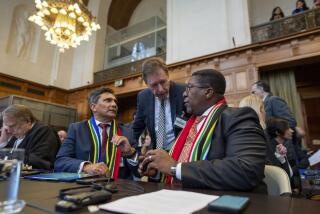U.N. Lifts Most of Its S. Africa Sanctions
- Share via
UNITED NATIONS — South Africa’s pariah status and the era of anti-apartheid boycotts ended Friday when the General Assembly lifted most of its remaining economic sanctions against Pretoria.
A voluntary oil embargo is to be lifted as soon as the Transitional Executive Council, a multiracial group that is to help govern the country, starts operating. A mandatory Security Council arms embargo will remain in place until a new, freely elected government is formed after the April 27 elections.
The action was largely symbolic because Western nations and the Organization of African Unity already have repealed sanctions adopted at the General Assembly’s behest.
Declaring that South Africa’s march to multiracial democracy has begun, the 184-nation assembly put an end to three decades of condemnations and voluntary sanctions in areas ranging from foreign investment to sports. And it urged its members to start doing business immediately with South Africa, which desperately needs it.
“Transition to democracy has now been enshrined in the law of South Africa,” the repeal resolution said.
Without a vote, without speeches or fanfare, the General Assembly adopted a resolution calling for repeal of the economic sanctions it has urged over the years. The announcement was greeted by applause.
South Africa’s ambassador, Vernon R. W. Steward, welcomed the move, saying the embargoes “have been a symbol for many years of a moral sanction against South Africa because of its policies.”
“The fact that they are removed has great impact throughout the world, as understanding that South Africa is no longer any kind of pariah in the community of nations but is a full-scale member,” he said.
Although it technically is a U.N. member, South Africa’s seat in the assembly was vacant Friday, a reminder of its 1974 suspension for its racist policies.
The lifting of the sanctions was expected after Nelson Mandela, president of the African National Congress, urged the international community last month to put aside its most potent weapon against apartheid and invest in a new South Africa.
From Brussels, where he is trying to drum up investment, Mandela said, “We are happy indeed that the world body is going to help and lift sanctions.”
Voluntary sanctions were imposed beginning in the 1960s to punish the white-minority South African government for its policies of racial segregation. But they acquired greater force in 1985 when the assembly gained worldwide compliance with its stronger call for punishment.
Over the past few years, however, many nations have ended the restrictions on trade as South Africa pursues democratic reforms. Since 1991, the General Assembly has called for resumption of academic, scientific, cultural and sporting links.
More to Read
Sign up for Essential California
The most important California stories and recommendations in your inbox every morning.
You may occasionally receive promotional content from the Los Angeles Times.













